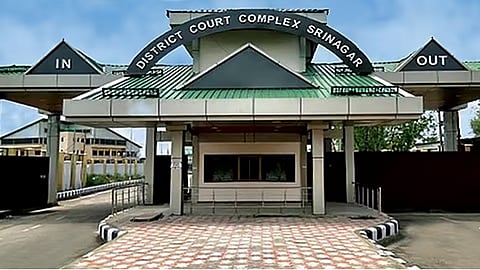

I completed an internship with a prosecutor in the District Court Complex Srinagar and saw J&K’s justice system firsthand. My first impression was great: prosecutors, judges, and staff were hardworking and capable, and the campus was well-designed. However, as I started speaking to people around me, I realised that this infrastructure houses a system with many faults.
The first court case I witnessed shocked me. I was struck on seeing that the crime dated back over 5 years. It gradually dawned on me that this was the average pace of most litigations. I came to understand that there are a series of obstacles to achieving justice in J&K. From the police investigation to the judge’s verdict, every stage of the legal process is slowed and complicated by fundamental issues in the system.
Police investigations rarely gather enough evidence for a guilty verdict. Even in cases where CCTV cameras capture a crime, police often do not deliver the certificate needed to verify footage. The lack of sufficient incriminating evidence results in an overwhelming number of acquittals, which frustrates prosecutors as they feel a sense of helplessness in reaching a conviction. Collecting sufficient incriminating evidence in Kashmir is rare.
Even when the police investigation is completed effectively, witness testimonies are essential to prosecution, and these often fall through. Kashmiris have long felt a level of distrust and disbelief in the legal system and therefore have little interest in pursuing justice. This causes a self-fulfilling prophecy where witnesses, especially expert witnesses, lose interest and do not appear for testifying. Additionally, since cases last for an average of 5.4 years, witnesses who appear have often forgotten details of the case.
Often, not just witnesses, but the victims themselves can lose faith in their own cases as the process moves so slowly. Victims are expected to appear in court many times over several years for any case, knowing that most do not result in a conviction. When the accused is found guilty, they often appeal, extending cases even longer.
Victims have a right to a speedy trial under Article 21, but this simply cannot be executed in J&K, with an average of 21 judges per million compared to a recommended 50 judges per million.
This demonstrates how difficult it is to achieve justice when people justifiably believe that it is unachievable.
This lack of effective execution of the legal system causes issues not just for prosecution and the victim, but also for the defence and accused. J&K and Ladakh have a total of 380,000 pending cases, and under trial prisoners make up over 86% of the prison population.
Court delays and extensions are therefore taking away peoples’ livelihoods, and sometimes their freedoms, without giving them their right to due legal process.
I observed the witness statement of a woman who filed her harassment case in 2019 and has since been travelling hours for every court hearing to complete every gruelling step of the legal process.
As she gave her statement, she was constantly asked to repeat or slow down as the stenographer was a fill-in, not the official stenographer of the court, and could not write quickly. In the middle, she was interrupted by an informal conversation in the court. On a day-to-day basis, the legal system is just as disorganised and ineffective. Heckled by the many disturbances and delays, her case is still ongoing. So are many others.
Legal justice system in J&K needs an overhaul - from drastic transformation of the process to a change in how people view the legal system. Improving witness support and filling judicial vacancies is a needed start, but the focus on serving Kashmiris must be emphasised to create real change.
Have you liked the news article?